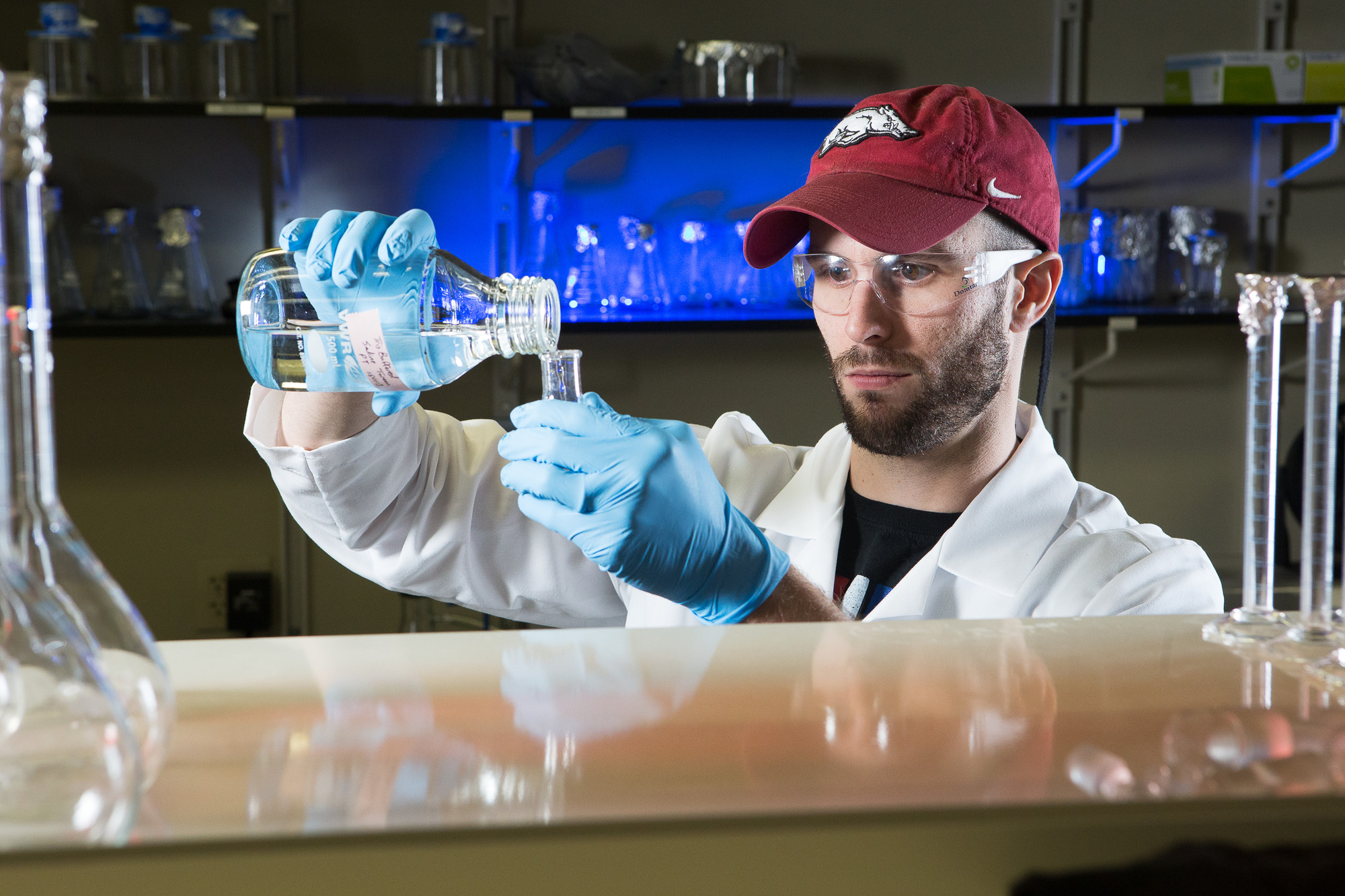Graduate Student Investigating Potential Alzheimer's Treatment Option

Phillip Turner, a doctoral candidate in chemical engineering, is investigating synthetic structures known as peptoids as a viable treatment for Alzheimer's disease.
FAYETTEVILLE, Ark. – Alzheimer’s disease, which affects as many as 5 million Americans, causes a progressive deterioration of brain tissue – and there is no known cure.
Phillip Turner, a chemical engineering doctoral candidate at the University of Arkansas, is investigating synthetic structures known as peptoids as a viable treatment for Alzheimer’s disease.
“Most treatment options today work on 50 percent of patients and only to slow the onset of symptoms,” Turner said, adding that even if some treatments work, they lose their efficacy after five to 10 years.
Those with Alzheimer’s slowly lose their cognitive abilities, and struggle with tasks that involve thinking and forming new memories. Most victims are older than 65, but Alzheimer’s can strike in the 40s or 50s.
Turner is working to develop a new peptoid to treat the disease as part of a research group at the U of A led by Shannon Servoss, an associate professor of engineering who holds the Ralph E. Martin Professorship in Chemical Engineering. Servoss and Melissa Moss at the University of South Carolina were awarded a patent last summer for peptoids and methods for treating Alzheimer’s disease.
Research suggests Alzheimer’s disease is caused by the accumulation of amyloid beta, a fragment of a protein that naturally occurs in the brain. Amyloid beta cluster together, resulting in branched chains that ultimately become clumps between brain cells that induce massive cellular death and ultimately shrink of the brain. Clumps called amyloid plaques are a main feature of Alzheimer’s disease.
To combat Alzheimer’s disease, it is crucial to prevent the formation of these clumps. There are peptides – small protein chains – that have been shown to reduce the accumulation of amyloid beta but were not satisfactory in trials on mice or humans because peptides were broken down in the body.
In his research, Turner implements the same benefits of the failed peptides by designing a similar but chemically different chain. This new chain, comprised of peptoids, is structurally similar to peptides but differs in that it is not as easily broken down in the body and does not incite an immune response.
“Peptoids have shown promising results, reducing the accumulation of amyloid beta by 80 percent,” said Turner, who won first place last fall in the chemical and health sciences category at the U of A’s graduate student poster competition.
“If peptoids don’t become a cure, at least they will show us that we can utilize non-natural compounds to treat diseases,” he said.
Turner, originally from Houston, earned a bachelor’s degree in chemical engineering from the U of A in 2010 and began his doctoral studies at the university that year.
“I never thought I would pursue a doctoral degree,” he said. “In the beginning of my junior year, I realized I didn’t want to be process or quality engineer in industry. That caused me to seek opportunities to do research as an undergraduate and eventually transition to graduate studies.”
Topics
Contacts
Phillip Turner, doctoral candidate
Chemical Engineering
479-575-4951,
jpturner@uark.edu
Chris Branam, research communications writer/editor
University Relations
479-575-4737,
cwbranam@uark.edu
Headlines
U of A Bands to Hold Three Nights of Concerts
The Symphonic Band, the Wind Symphony, the 4 O'Clock and 5 O'Clock Bands and the Wind Ensemble will perform April 21-23 at the Faulkner Performing Arts Center on the U of A campus.
Honors College to Host 'Best in Show' Dog Celebration
The campus and community are invited to celebrate our furry friends with popsicles, water and dog treats from 3-4 p.m. Thursday, April 25, in the Gearhart Courtyard.
New Parasite Affecting Canadian Partridges Named for Arkansas Poultry Scientist
A long-time colleague in Canada gave a newly found parasite the scientific name Eimeria hargisi in honor of U of A poultry science researcher Billy Hargis.
U of A School of Law Student Selected for Ms. J.D. Leadership Academy Intensive
Tristan Branstetter-Thomas, a second-year law student, was one of 30 students from across the country chosen to participate in the leadership academy at the Northwestern Pritzker School of Law in Chicago.
Needy Honored as Distinguished Alumna of University of Pittsburgh Engineering College
College of Engineering Dean Kim Needy was among seven alumni of the University of Pittsburgh Swanson School of Engineering honored in April as part of the 2024 Class of Distinguished Alumni.




